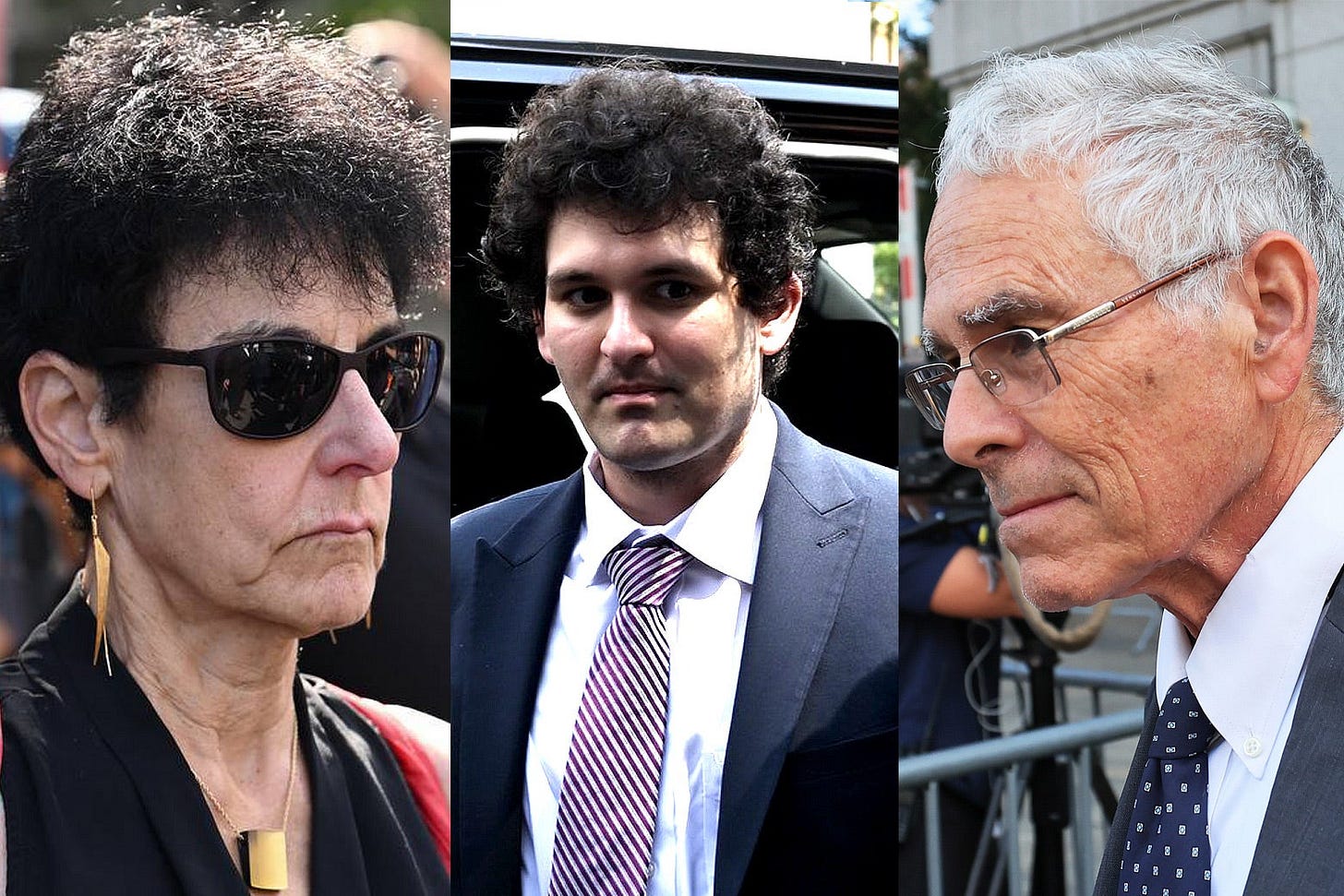Can we blame Sam Bankman-Fried's parents for Sam Bankman-Fried?
Can we blame anyone for anything?
Catch-up service:
Winners and Losers: The Zero-Sum Mindset
The Best Reason to Believe Woody Allen is Innocent is the Simplest One
Notes on ‘Succession’
This week, Sam Bankman-Fried’s former company FTX sued his parents, Joseph Bankman and Barbara Fried. FTX is now under the operational control of John Jay Ray III, a name straight from a Coen brothers movie. Ray is an attorney who specialises in recovering funds from failed companies; his biggest case was Enron. He was appointed CEO of FTX by the authorities after the company’s collapse, late last year.
Ray is already suing Sam Bankman-Fried (SBF) and the FTX inner circle for fraud. SBF’s trial starts next week. In the meantime, Ray has launched another lawsuit, alleging that Bankman and Fried were co-conspirators with their son, and that they enriched themselves illegally at the company’s expense. The lawsuit, which is publicly available, is grimly entertaining.
Ray’s targets are pillars of the American establishment, blue aisle. Both Bankman and Fried are longstanding law professors at Stanford University and hyper-connected champions of liberal causes. Joe Bankman, 67, is a leading scholar in tax law (he’s also a qualified psychologist and licensed counselor). Barbara Fried, 72, is an ethicist and Democrat activist, the co-founder of Mind The Gap, which advises tech executives on which progressive candidates to back, based on data. Both parents have specialised in questions of social fairness, and describe themselves as “utilitarian-minded”, a predisposition shared by their son, who was, famously, a leading light in the effective altruism movement.
In 2021, Joe Bankman took leave from Stanford to become a full-time employee of FTX. He was given a salary of $200,000 plus expenses. He didn’t think that was nearly enough. We know this because the lawsuit includes emails he sent after receiving his first paycheck. Bankman wrote first to an FTX executive, complaining that he was “supposed to be getting $1M/yr”. After making no headway there, he elevated the grievance to his son: “Gee, Sam I don’t know what to say here. This is the first I have heard of the 200K a year salary! Putting Barbara on this.” In other words, he went over Sam’s head to an even higher power. Joe Bankman also flew on private jets, expensed $1,200-per-night hotel stays, and insisted on making a cameo appearance in FTX’s Superbowl ad (in his email to Sam asking for the role, he says really wanted to meet the ad’s star, Larry David, which, fair enough).
Within two weeks of Joe’s complaint, SBF gifted his parents $10 million, which, according to the suit, he plundered from an account containing customer funds. Ray argues that the parents knew exactly what was going on. In an email, Joe Bankman proposed a series of methods by which Sam could transfer the money from FTX to Joe and Barbara without paying tax.
Shortly after that, Sam bought them a thirty-thousand-square-foot Bahamas house worth $16.4m (see above), again taken from funds. Meanwhile, Joe and Barbara were pushing Sam to make massive corporate donations to favoured charities, contributions which the law suit argues “were seemingly designed to boost Bankman’s and Fried’s professional and social status.” If that seems unduly cynical, note that they arranged to donate over $5m to Stanford, an extremely rich institution and also their employer. The suit argues they knew or certainly should have known that all of this money was being embezzled from SBF’s companies and that the donations broke campaign finance rules, indeed it claims that Barbara, who sought millions of dollars for Mind The Gap, suggested FTX employees make fake private donations in order to conceal the true source of the money.
If Joe and Barbara behaved as the suit alleges then, given that they raised Sam, can we blame them for him? If you are raised by grasping hypocrites with an unbreachable confidence in their own virtue, perhaps it isn’t your fault if you turn out the same. But if so, who should we blame for Joe and Barbara? Their environment, perhaps? They lived in a social milieu - Ivy League academia, big tech, Democratic donors - which provided constant reassurance that they were good people, doing good deeds, no matter what deeds they actually did. Confronted with tempting opportunities offered by their son’s farcical success, the poor things didn’t stand a chance. Maybe nobody is to blame here.
I’m not being entirely facetious. The topic of whether and who to blame for crimes and misdemeanours is a contentious one within the legal system, among philosophers, and in policy circles. When it comes to violent crime, for example: if a kid is raised in a brutalised environment with few legitimate opportunities, to what extent is he to blame for doing drug deals as an adult? Similar questions apply to organisations, especially in industries where lives are at stake. The person at the end of a chain of errors often carries the can for everyone else. If a plane crashes due to pilot error, do we blame the pilot or the processes which allowed his error to become a catastrophe? Every time there is a scandal in the NHS, some argue it’s unfair to blame the individuals who are ostensibly at fault when it’s the system which is the real problem. When he was Health Secretary, Jeremy Hunt made it his goal to change the NHS’s “blame culture” into a “learning culture”.
Indeed, some ethicists believe that blame should be done away with altogether. The nub of the debate is whether people can be said to freely choose their actions, or whether what we do is always predetermined in some way - by situation, by upbringing, by environment, by biology. If free will is mostly or completely an illusion - if we are not captains of our own ship but hapless sailors at the mercy of the weather - then blaming individuals will always be unfair.
The philosophical arguments for and against blame are laid out in a lucid and witty article in the Boston Review from 2013, entitled “Beyond Blame”. On one side have been those who, following Peter Strawson, argue that the urge to blame is a deep-rooted emotion which it would be futile and counter-productive to try and eradicate. All human societies have used blame as a tool to control antisocial behaviour. It’s who we are. On the other side are those who believe the concept of blame should be considered a relic from a less enlightened, more religious and moralising age, before we learnt to analyse the structural forces which push people one way or another. This is the side that the article’s author comes down on. The article ends by arguing that, in America at least, the balance of society has tilted too far towards blame:
We have gotten nothing from our 40-year blame fest except the guilty pleasure of reproaching others for acts that, but for the grace of God, or luck, or social or biological forces, we might well have committed ourselves. Our schools are broken, a new generation of kids has been lost, our prisons are crammed with petty offenders whose lives we have ruined in the name of a war on drugs that has been a total failure. And judging from the current mood of the country, the guilty pleasure of blaming others has not proved all that pleasurable…The next time something goes terribly wrong, suppose that instead of immediately asking who is to blame, we were to ask: How can we fix this problem?
The author is, if you haven’t already guessed, Barbara Fried, law professor, eminent ethicist, and owner of a very large beach-house in the Bahamas.
Fried focuses on offenders in the war on drugs, but not all crimes are carried out by those at the sharp end of inequality. The rich and well-connected break laws too, and when we read about their cases it becomes much harder to accept that perpetrators don’t freely choose their actions. We are also, perhaps, more alert to false dichotomies. Isn’t it possible to blame individuals who have done reprehensible things and fix the problem? I’m glad, for instance, that the NHS will institute Martha’s Rule, following the death of Martha Mills, but I would still like to see the doctors involved held accountable.
And yes, if Bankman-Fried, and Bankman and Fried, are found guilty, I think we should blame them for being, at best, grossly irresponsible and at worst disgustingly greedy, and make it harder for unscrupulous rich people to further enrich themselves via illegal means. Although, ironically, the FTX debacle exposes the limits of “fix the problem”. I’m no expert on American financial regulations but I’m not sure the lesson here is that the system needs to be changed, since it may be that no matter how tightly or precisely you draw the rules, expert insiders with a thirst for money and status will always find a way to evade them. If so, then our best hope is that the culprits get caught, punished and shamed.
Welcome to new followers from Australia (and elsewhere) who joined after hearing me talk about curiosity on Sarah Wilson’s podcast. You’ll get a lot more out of the Ruffian if you sign up for a paid subscription (free trial below). You’ll also be helping me out: beach-houses in Margate aren’t cheap these days.
After the jump this week: a real life ‘Succession’ drama, no, not the Murdochs; the British government doing something genuinely exciting (really!); sublime performances of Bach and by Prince. Oh and a Beatles song you almost certainly haven’t heard before…





